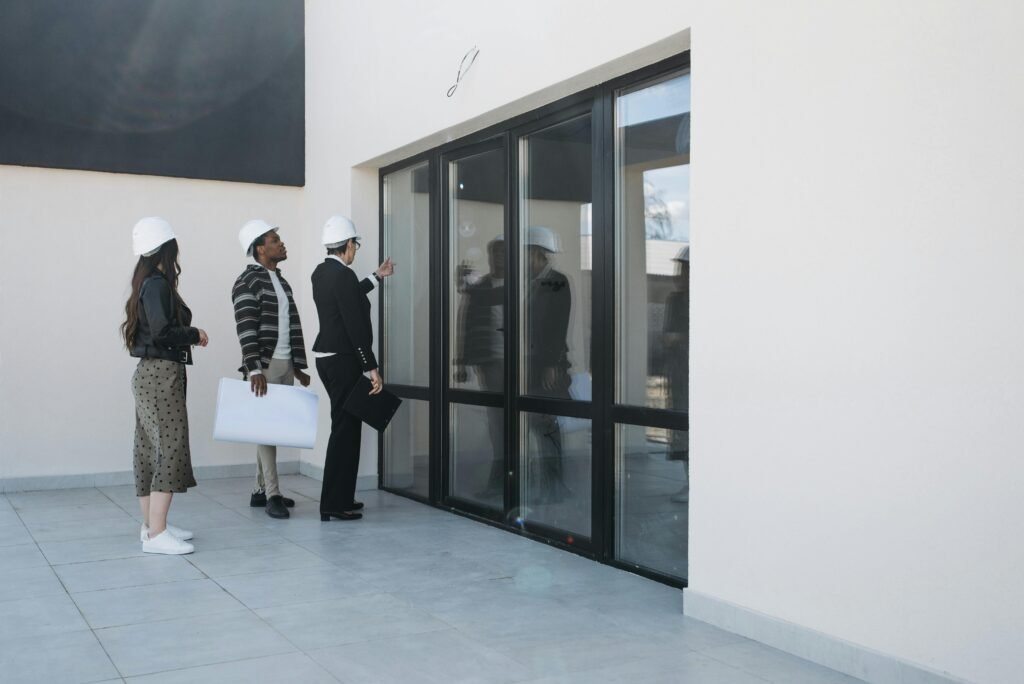
REAL ESTATE INVESTMENT PITFALLS TO AVOID IN 2025

Table of Contents
REAL ESTATE INVESTMENT PITFALLS TO AVOID IN 2025
Welcome to Year 2025, a brand new year that holds a lot of promise. It is a fresh opportunity to start again, to pursue that dream and to achieve that goal. It is also a time to go for your real estate investment dream and make it a reality.
Whether it is fear, indecision, or lack of information that has held you down from embarking on your real estate investment dream until now, the new year comes with an opportunity to overcome them.
Embarking on your first real estate investment is an exciting and potentially rewarding venture. It offers the promise of steady income, the potential for appreciation, and a powerful opportunity to build long-term wealth. However, the path to success in real estate investment is not always straightforward, especially if it is your first time. While the rewards can be significant, the journey is often fraught with challenges, and novice investors may encounter common pitfalls that can impede their progress.

The key to successful real estate investing lies in understanding the potential roadblocks that could derail your real estate investment plans with a decision to avoid such pitfalls. From overpaying for a property to neglecting due diligence, many mistakes can affect the profitability of your investment. It is essential to be aware of these obstacles, as they could result in unexpected expenses, poor returns, or even complete financial losses.
In this article, we will highlight several critical factors that can hinder your success as a real estate investor while also providing valuable insights on how to avoid these pitfalls, so you can navigate your investment with greater confidence and clarity in the new year.
The following are real estate investment pitfalls to avoid in 2025:

Pitfall 1: Investing Without a Plan
Just like with any important venture, whether it is a personal goal or a financial undertaking, having a clear plan in place is essential, especially if you expect to see positive results. Without a strategy, your chances of success is significantly reduced, and you may end up facing avoidable challenges.
When it comes to real estate investment, the impulse to buy the first property you can afford might seem tempting, but it is a shortsighted approach. Simply purchasing property without considering how you will generate income or ensure long-term profitability is a risky financial move that can lead to financial strain or missed opportunities.
Real estate investing requires careful thought and strategic planning to avoid real estate pitfalls. A solid plan should outline your investment goals, financing options, projected returns, and how you intend to manage the property. Whether you are looking for rental income, property appreciation, or a combination of both, planning for the long term is crucial to ensure your investment aligns with your financial objectives.
This common mistake — investing without a plan — is one of the most detrimental errors you can make in real estate. By taking the time to develop a thoughtful strategy, you can avoid unnecessary risks and set yourself up for success in the ever-changing property market.

Pitfall 2: Failure to Conduct Due Diligence before investing in real estate
Failure to conduct due diligence in real estate investment can lead to significant financial losses and missed opportunities. Due diligence refers to the comprehensive research and verification of all aspects of a property before purchasing, ensuring that the investment is sound and legally secure. When investors skip this critical process, they expose themselves to various risks.
One major pitfall is purchasing property with unclear or fraudulent ownership titles, which can result in legal disputes and loss of ownership. Without confirming the authenticity of land titles and conducting proper background checks, investors may unknowingly buy properties involved in legal battles or claims from multiple parties.
Additionally, neglecting to assess the property’s physical condition can lead to costly repairs and unforeseen maintenance expenses. Structural issues, outdated plumbing, or electrical problems can dramatically increase investment costs if not identified early.
Failing to research the local market, economic trends, and zoning laws also increases the risk of poor investment decisions. A property in an oversaturated or underdeveloped area may not generate expected returns. Moreover, legal and environmental regulations that affect the property could lead to compliance issues or further costs.
In summary, conducting thorough due diligence is essential in real estate investment to safeguard against financial losses, legal disputes, and poor investment choices.

Pitfall 3: Avoid High Borrowing Risks When Investing in Real Estate
With rising interest rates in many countries, borrowing too much for real estate investments can become a costly mistake. Over-leveraging, or taking on excessive debt, can expose investors to significant financial risk, especially when market conditions fluctuate. When interest rates increase, monthly mortgage payments also rise, making it harder to maintain cash flow, especially if the property fails to generate the expected rental income or appreciate in value.
For instance, if rental income does not meet projections due to factors like market oversaturation, tenant vacancies, or economic downturns, investors may struggle to cover mortgage payments. Additionally, if property values stagnate or decrease rather than appreciating as anticipated, investors may find themselves underwater, owing more on the property than it is worth. In such cases, it can become increasingly difficult to meet debt obligations, potentially leading to foreclosure.
Moreover, high borrowing risks can lead to a snowball effect, where mounting debt forces investors to liquidate assets or take on more loans to cover existing obligations, increasing the likelihood of financial collapse. To avoid these pitfalls, investors should be cautious about their debt-to-equity ratio, ensure they have adequate reserves for market fluctuations, and avoid overextending themselves financially. Properly managing borrowing risks is crucial for long-term success in real estate.

Pitfall 4: Don’t Let Sentimental Value Cloud Your Judgment When Investing in Real Estate
When investing in real estate, it is essential to avoid letting sentimental value influence your decisions. Many investors are tempted to buy properties simply because they hold personal significance or are recommended by family and friends, but these emotional connections can cloud your judgment and lead to poor investment choices. It’s easy to get attached to a property due to its aesthetics, location, or sentimental appeal, especially if it reminds you of fond memories or comes with personal endorsements. However, successful real estate investment requires a disciplined, data-driven approach.
To make the most of your investment, stick to clearly defined investment criteria, such as projected return on investment (ROI), location demand, and market trends. Prioritize properties that offer strong rental income potential or long-term appreciation based on objective factors, not personal attachments. Emotional decision-making can lead to overlooking critical factors like structural issues, the property’s condition, or the financial viability of the investment.
For example, a family member might suggest buying a home in an area with declining property values, but following that advice solely because of the relationship could result in significant financial losses. By sticking to rational, evidence-based decision-making, you’ll maximize your chances of successful real estate investments and avoid emotional pitfalls that could undermine your financial goals.

Pitfall 5: Ignoring the Power of Location in Real Estate Investment
Just as the business model is crucial when investing in equity, location holds equal importance when it comes to real estate investment. A property’s location can make or break its potential for growth, rental income, and long-term value appreciation. It’s essential to choose properties in areas with high demand, strong infrastructure, and a positive future outlook.
Several factors contribute to a location’s desirability, including job growth, proximity to key amenities, and ease of access to transportation hubs such as airports, highways, and public transit. Areas with thriving job markets often attract more residents and businesses, increasing demand for housing and commercial spaces. Similarly, neighborhoods close to schools, shopping centers, parks, and other conveniences are more likely to attract tenants and buyers, which drives up property values.
On the other hand, investing in properties located in remote or underdeveloped areas can be risky. For instance, a property in a secluded area with limited access to essential services or infrastructure may struggle to attract tenants or buyers. Without urban attractions, such as employment opportunities or easy access to transportation, the likelihood of seeing high returns diminishes. Ultimately, location is a fundamental factor that directly influences the success of your real estate investment, and it should always be carefully considered before making a purchase.

Pitfall 6: The Risk of Single Property Focus in Real Estate Investment
Relying too heavily on a single property type or location can expose investors to significant financial risk when it comes to real estate investment in 2025. When you invest in only one type of property—such as residential, commercial, or industrial—or concentrate your investments in a single geographic region, your portfolio becomes vulnerable to market fluctuations or economic downturns in that specific sector or location.
For example, if the economy suffers a downturn that impacts commercial real estate, an investor focused solely on office buildings or retail spaces could see a sharp decline in their investment value. Similarly, a residential-focused investor may be impacted by local market conditions, such as oversupply or declining demand in their chosen area. In such scenarios, having a diversified portfolio becomes essential to mitigate risk.
Diversifying your real estate investments into different property types, such as residential, commercial, mixed-use properties, or even properties in different locations, helps spread risk. For instance, while residential properties might face challenges, commercial real estate in another region may perform better. By balancing your portfolio, you increase the chances of maintaining steady returns, regardless of fluctuations in any one segment of the market. Diversification is a key strategy for long-term stability and growth in real estate investing.

In conclusion, it is important to remember that your first investment is a learning experience, and even seasoned investors encounter challenges along the way. That said, while mistakes are inevitable, it’s crucial that they don’t become major setbacks that knock you out of the game entirely. The goal is to minimize mistakes, learn from them, and build a foundation for future success. With the right knowledge and preparation, your first real estate investment can be a stepping-stone toward building a profitable and sustainable investment portfolio.








